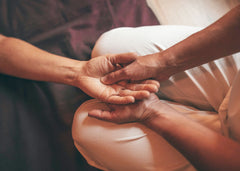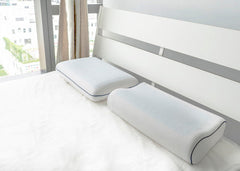You climb into your cozy bed, snuggle up under your blanket and drift off to sleep. However, you wake up a few hours later and find yourself drenched in sweat. So why can we comfortably fall asleep but wake up a few hours later feeling hot and sweaty? Let’s take a closer look on what causes these uncomfortable night sweats and see what you can do to relieve them.

What causes night sweats?
1. Your Bedroom is Too Warm
If you’re tossing and turning at night and wake up drenched in sweat, the most common reason is that your bedroom is too warm. Experts say that the ideal temperature for sleeping is roughly 16 - 21oC.

2. High Metabolism Rates
Everyone knows exercising is good for health. However, if you exercise too close to bedtime, it will affect your sleep quality. Exercise not only boosts your metabolism rates, but this triggers night sweats. According to research from the "Medicine & Science in Sports & Exercise" journal, metabolism levels can stay elevated for up to 14 hours after vigorous exercise.

3. Physical and Psychological Factors
There are also many physical and psychological factors that can lead to night sweats, including:
- Menopause - Night sweats are very common for women that are about to or are going through menopause.
- Hormonal Imbalances - When your hormones are imbalanced, such as while you’re pregnant or having thyroid issues, you are more likely to experience flushing or sweating.
- Infectious Diseases - Many infectious diseases can lead to a fever, which in turn often leads to night sweats.
- Anxiety - Increased sweating is one common physical sign associated with stress or negative emotions.

How we can prevent sleeping hot at night
Getting rid of night sweats depends on the underlying cause. Here’s what you can do to reduce excessive sweating at night.
1. To reduce night sweats, try to sleep in a cooler environment. The best temperature range for sleep is around 16 - 21oC.
2. Less breathable mattresses can also contribute to your sweaty sleep woes. Besides being uncomfortable, retaining excessive body heat while you sleep can lead to restless nights and interrupts your sleep cycles. Make sure your mattress and pillows are highly breathable and allow you to sleep cool.

3. Eating and snacking before bed isn’t good if you’re easily drenched in sweat at night. In particular, avoid consuming alcohol, caffeine or spicy foods as these can increase your body temperature and lead to night sweats.

4. Stress and anxiety are common causes of night sweats. The first step you can do is to find the right/ the most comfortable way for yourself to manage stress and anxiety. Leisure writing, reading, meditation, or practicing yoga are all good ways to help you relax.





